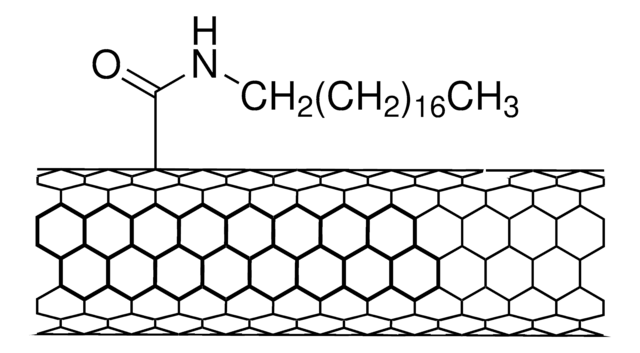639230
Carbon nanotube, single-walled
polyaminobenzene sulfonic acid functionalized, 75-85%carbon basis, D × L 1.1 nm × 0.5-1.0 μm , bundle dimensions
Sinónimos:
Carbon nanotube, single-walled, PABS functionalized, SWNT, PABS functionalized
About This Item
Productos recomendados
product name
Carbon nanotube, single-walled, polyaminobenzene sulfonic acid functionalized, 75-85% carbon basis, D × L 1.1 nm × 0.5-1.0 μm , bundle dimensions, avg. no. of layers, 1
assay
75-85% carbon basis
form
powder
mol wt
average Mw 400-600 g/mol (PABS)
feature
avg. no. of layers 1
extent of labeling
65% (PABS, typical)
D × L
1.1 nm × 0.5-1.0 μm , bundle dimensions
impurities
4% metals
solubility
ethanol: 0.05 mg/mL
DMF: 0.1 mg/mL
H2O: 5.0 mg/mL (As determined by near-IR absorbance spectroscopy.)
functional group
sulfonic acid
Categorías relacionadas
General description
Application
Packaging
Preparation Note
Analysis Note
signalword
Warning
hcodes
Hazard Classifications
Eye Irrit. 2 - STOT SE 3
target_organs
Respiratory system
Storage Class
11 - Combustible Solids
wgk_germany
WGK 3
flash_point_f
Not applicable
flash_point_c
Not applicable
ppe
dust mask type N95 (US), Eyeshields, Gloves
Certificados de análisis (COA)
Busque Certificados de análisis (COA) introduciendo el número de lote del producto. Los números de lote se encuentran en la etiqueta del producto después de las palabras «Lot» o «Batch»
¿Ya tiene este producto?
Encuentre la documentación para los productos que ha comprado recientemente en la Biblioteca de documentos.
Los clientes también vieron
Artículos
Carbon nanotubes are materials that possess remarkable properties and offer extraordinary possibilities.
Carbon nanotubes (CNTs) have received much attention since their discovery in 1991 by Sumio lijima1 due to their excellent mechanical, electrical, and optical properties.
A nanocomposite is typically defined as a mixture between a host material (e.g., polymer matrix) and nanofillers with at least one dimension of less than 100 nm.
SWCNTs show promise in FETs, solar cells, and photodetectors due to their ultrafast charge transport mobility.
Nuestro equipo de científicos tiene experiencia en todas las áreas de investigación: Ciencias de la vida, Ciencia de los materiales, Síntesis química, Cromatografía, Analítica y muchas otras.
Póngase en contacto con el Servicio técnico











